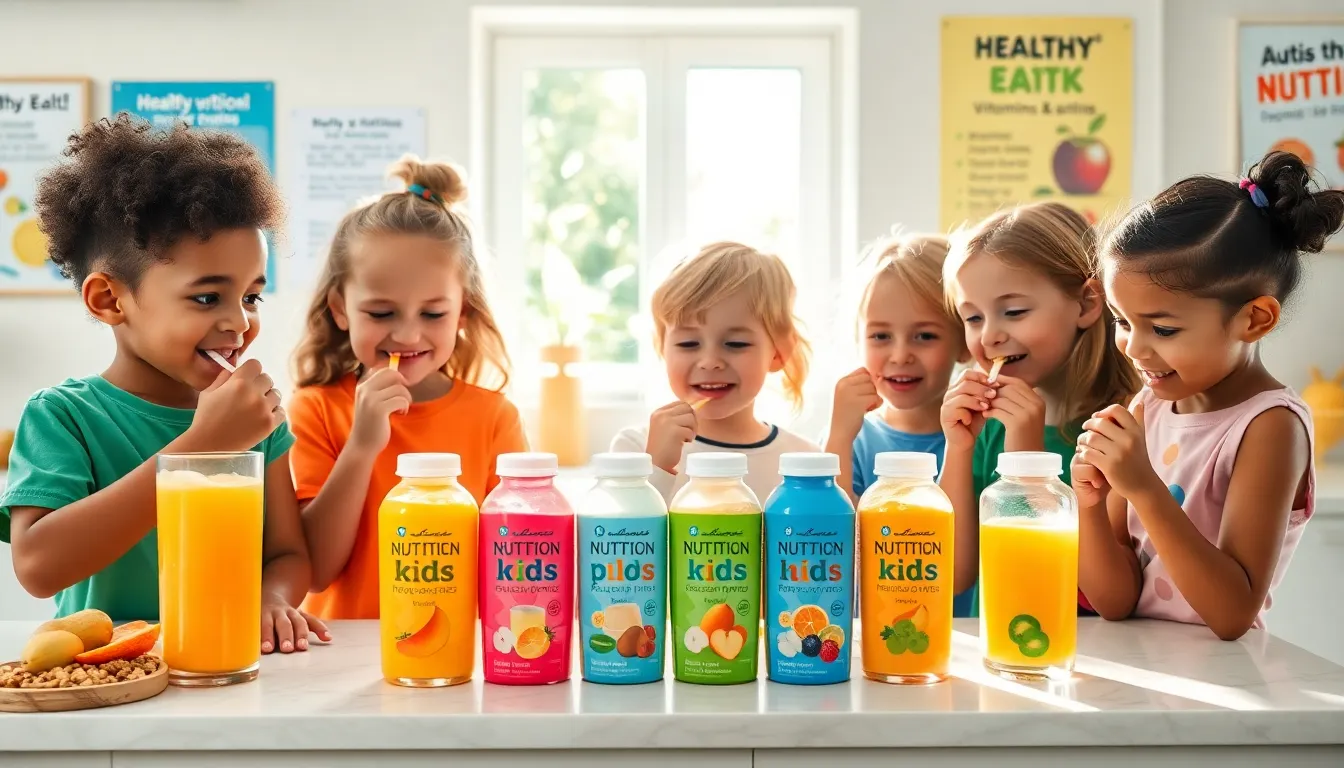When it comes to nourishing their little bodies, kids can be notoriously picky eaters. Enter the realm of nutrition drinks: a tasty solution packed with essential nutrients that might even make broccoli seem less daunting. These drinks can bridge the gap where traditional meals fall short, offering a convenient way to ensure kids receive adequate vitamins and minerals in their diet. But how do parents choose the right one? Buckle up: we’re diving deep into the delicious world of nutrition drinks for kids.
Table of Contents
ToggleThe Importance Of Nutrition For Growing Kids

Nutrition is paramount for children as it fuels their rapid growth and development. Children undergo significant physical changes, and proper nutrition provides the building blocks their bodies need. Adequate nutrition supports cognitive development, boosts the immune system, and lays a foundation for healthy habits that can last a lifetime.
Every parent wants their child to flourish, so understanding the importance of balanced nutrition is essential. With their busy schedules and active lifestyles, some kids may not get all the nutrients they need from meals alone. This is where nutrition drinks come in handy. They’re not just supplements: they can be an integral part of a child’s diet.
Feeding children nutritious food contributes to their overall well-being, promoting better concentration in school, improved moods, and more energy for play. With adequate nutrition, they can unleash their full potential.
Key Nutrients In Kids’ Nutrition Drinks
Understanding what nutrients are important is crucial when selecting a nutrition drink for kids. Here are some essential components to look for:
- Proteins: Proteins are the body’s building blocks. They support growth, build muscles, and help with overall development. Many nutrition drinks are formulated with whey or plant-based proteins to cater to various dietary needs.
- Vitamins and Minerals: Look for drinks rich in vitamins A, C, D, and E, along with minerals like calcium and iron. These nutrients play critical roles in developing strong bones, boosting immunity, and enhancing cognitive function.
- Fiber: Fiber is key for digestive health. It aids in preventing constipation and contributes to a feeling of fullness. A high-fiber drink can help children control their appetite and maintain a balanced diet.
- Healthy Fats: Omega-3 and omega-6 fatty acids foster brain development and support cardiovascular health. Nutrition drinks that include these healthy fats can greatly benefit children’s growth.
- Low Added Sugars: While kids love sweetness, it’s best to choose drinks with low added sugars. High sugar content can lead to energy spikes followed by crashes, not to mention long-term health issues.
Choosing The Right Nutrition Drink
Choosing the right nutrition drink is like finding the perfect school for your child, there’s no one-size-fits-all solution. Here are a few tips for parents to consider:
- Check The Label: Always read the nutrition label before making a decision. Look for drinks that boast a blend of protein, vitamins, minerals, and fiber. Transparency about what’s inside goes a long way.
- Taste Testing: Kids can be picky, so getting them involved in the decision process can be beneficial. Try out a few different flavors: a taste test can help you discover what they enjoy the most.
- Dietary Needs: Be mindful of your child’s dietary restrictions or allergies. Whether they are lactose intolerant or following a vegan diet, there are tailored options available.
- Consult Experts: When in doubt, consult a pediatrician or a registered dietitian. They can provide personalized recommendations based on your child’s unique needs.
Homemade vs. Store-Bought Nutrition Drinks
The age-old debate: homemade versus store-bought nutrition drinks. Each option has its merits and can serve a purpose in a child’s diet.
Homemade Nutrition Drinks:
Creating nutrition drinks at home can be a fun and rewarding experience. Parents can control the ingredients, ensure freshness, and tailor the flavor to match their child’s preferences. For example, a smoothie made with yogurt, fruits, nuts, and a bit of spinach can provide a nutritional powerhouse without any unwanted additives.
Pros:
- Customizable ingredients to suit specific dietary needs.
- No preservatives or artificial flavors.
- Engages kids in preparation, making them more likely to drink it.
Cons:
- Time-consuming to prepare.
- May require more ingredients than a simple store-bought option.
Store-Bought Nutrition Drinks:
For busy parents, store-bought is often the way to go. Convenience is a significant advantage, with a range of flavors available to please even the pickiest eaters. Many brands offer high-quality options packed with essential nutrients, making them a practical solution for busy days.
Pros:
- Quick and easy option for on-the-go lifestyles.
- Often fortified with vitamins and minerals.
Cons:
- Potential for added sugars and preservatives.
- Limited control over ingredients.
Incorporating Nutrition Drinks Into A Child’s Diet
Incorporating nutrition drinks into a child’s diet can seem daunting, but it’s easier than it sounds. Here are some practical suggestions:
- As a Meal Supplement: Use nutrition drinks in place of or alongside meals, especially if a child struggles to finish their food.
- Post-Workout: After a long day at school or a rigorous game of tag, a nutrition drink can replenish lost energy and provide necessary recovery support.
- Snack Time: Instead of sugary juices or soda, offer a nutrition drink as a midday snack. Mix it with fruits or granola for an extra nutritional boost.
- In Creative Recipes: Blend nutrition drinks into pancake or muffin batter for added nourishment without compromising taste.
- Pairing with Meals: Encourage children to enjoy their drink with meals. A delicious taste can enhance their overall dining experience and encourage healthy eating habits.
Potential Concerns And Considerations
Although nutrition drinks hold many benefits, there are potential concerns to be mindful of:
- Not a Substitute: They should complement a balanced diet, not replace whole foods. Fresh fruits, vegetables, and protein sources should never be overlooked.
- Allergies and Intolerances: Always consider any allergies or dietary restrictions. Check labels thoroughly for potential allergens, especially if your child has known sensitivities.
- Overconsumption: Parents need to monitor consumption. Just because a drink is nutritious doesn’t mean it should be consumed in excess.
- Costly Choices: Some premium nutrition drinks can come at a steep price. Budget considerations should guide choices, and many affordable options are great as well.





